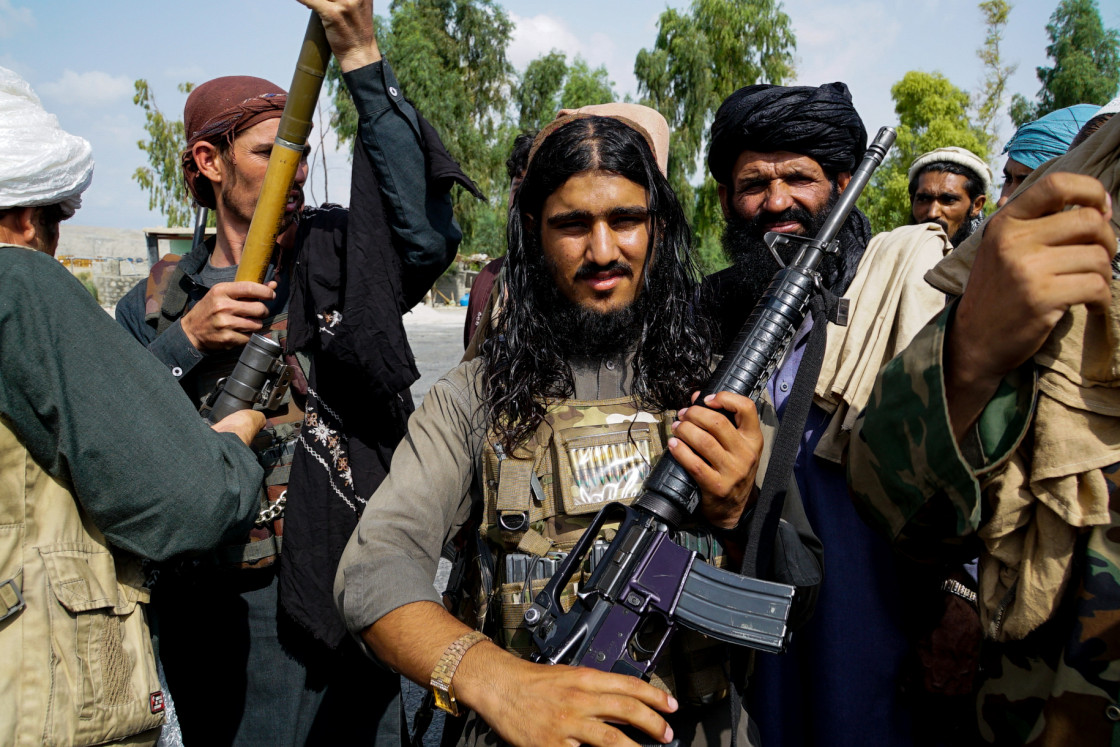
We travelled to Afghanistan to see what kind of country its new, infamous overlords, the Taliban, are building. Crossing the border, our reporter found himself in a situation that seemed to confirm the ominous predictions, but an unexpected turn of events showed that this picture is more complex than one may imagine. We learned what Taliban leaders think of women, 9/11, and houseguests. Telex's report from Afghanistan.
Since the Taliban takeover, few journalists have travelled to Afghanistan to report on how the new regime changed the country and ask locals how it affected their own worlds. Of all Hungarian media outlets, Telex was the only one to send a reporter over there. We will publish a selection of his report series in English as well.
The reports by András Földes cost approximately a million forints and were financed by our supporters.
If you wish to read more similar reports by Telex showing what is happening in Hungary and around the world, please, consider making a donation here.
Afghanistan knows its theatre; the landscape of rolling hills and deserts seen in Pakistan suddenly stops a few kilometres from the Afghan border, wrinkling into a row of steep mountains, and before I could notice, our jeep was bumping along next to wild gorges and valleys that seemingly opened up from nothing. If this is what Afghanistan is like, I completely understand how the term "the graveyard of empires" came about.
My pulse doubled and, due to what happened later, refused to go back down again.
The border crossing was at the tightest spot of a ravine. The space crammed between the steep rock walls felt like the set of a gladiator movie. A mix of heat, dust, and a thick crowd whirled around us. Getting out of the car, I immediately found myself in the middle of a wrestling match: eight or ten bearded guys were clamouring around me, offering to take my luggage to the border, exchange money, or sell me SIM cards. I yelled back at them to leave me alone. They shouted that it was alright, just let them know if I needed anything. I screamed, no, thank you. Finally, they jovially bellowed that they would be over there in the shade if I did after all.
It was clear that this was not aggression; in this neck of the woods, yelling is the basic building block of all communication, so I shouted goodbye to my driver and threw myself into the gladiator combat that was crossing the border.
I pushed myself forward into the tight cage surrounded by tall iron fences, flanked by the booths the officials were sitting in. After waving my certificates, visas, and PCR test results around for two hours, I finally emerged on the other side of the Afghan border with a victorious smile, which disappeared from my face as I realized the lions just got released into the arena.
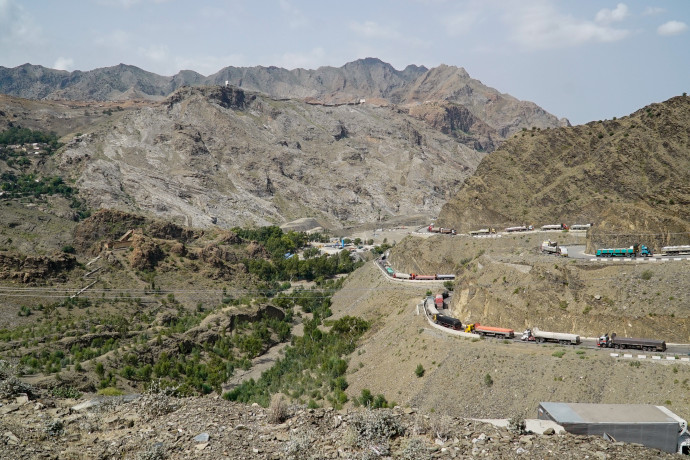
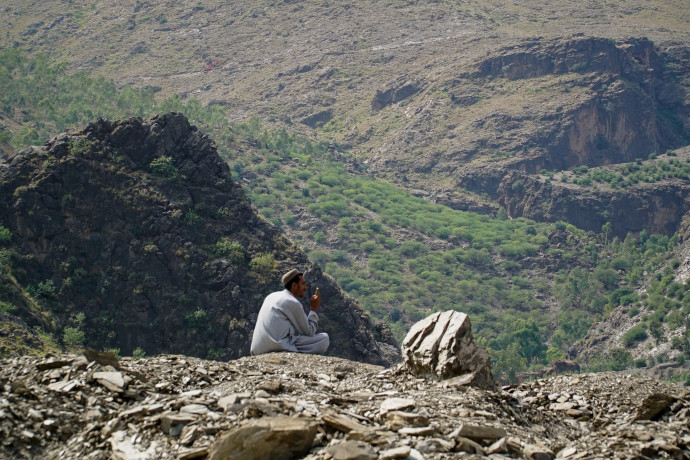
Teens with machine guns
As I looked around, I saw kids covered in dirt, droves of turbans, a whole lot of guns, and there was even more yelling. In the middle of all this insanity, there was a guy with an awkward smile and a piece of paper with my name on it. It was as if a formally dressed gentleman waited for me with a greeting sign on Omaha beach while I was dodging bullets on D-day.
"Nasser," my fixer introduced himself. We shook hands. However, my joy over the courteous welcome only lasted a few seconds, as suddenly, a pimpled teenager sporting greasy long hair and camo gear popped up, with a brand new M-16 assault rifle dangling on his shoulder. Hyperactive teens with live firearms – the worst combination in the world, I thought. I had no time to ponder this any further, as the boy tore my passport from my hand and, with a self-satisfied grin, signalled us to follow him.
We ran after him to the outpost guarded by machine guns and sandbags on the other side of the street. Someone shut the iron gate behind us with a loud bang as we entered the dusty courtyard, where young boys wandered around like school just finished, except instead of smartphones, they had rifles with the price tag still attached. I whispered to my fixer:
"The letter. Let's show him the letter!"
I was talking about the document he acquired from the Taliban, which, according to rumours circulating among reporters, is the only thing that can ensure you reach Kabul with your skin intact.
Damping his voice, Nasser began telling a convoluted story, flashing the letter on his phone. "But that is the letter I got and sent over to you last week as a sample, isn’t it?" I asked him with pleading eyes. "Yes," he admitted as if he didn't know he was supposed to lie to our detainers and not me.
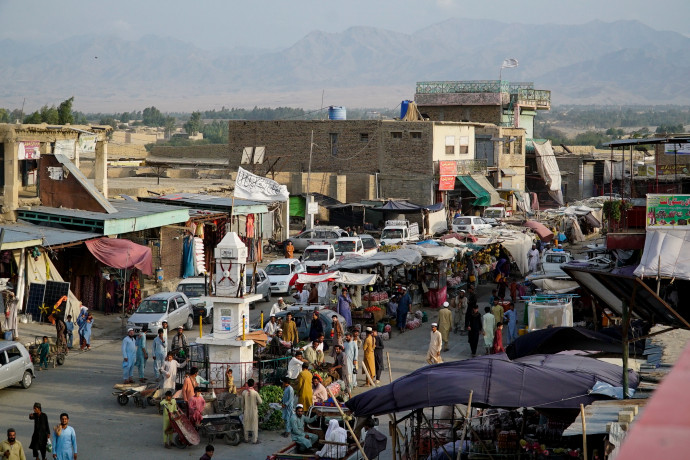
I won't get into the details. The gist of the story was that my fixer told me a day before that I can enter the country without an issue, all the necessary documents are at hand. This, apparently, was not entirely true. I knew that at that point, there was no sense in prying why, or what the plan was, or how we could move on without our papers in order.
I asked him if he could call someone in Kabul who could get me a permit, maybe showing a photo of the letter would suffice, and we could walk away. "Of course," he nodded. In this time zone, "of course" means there is a ten per cent chance for success.
Six hours of waiting in a shady corner of the scorching courtyard ensued while armed Taliban teenagers gave us menacing looks.
Nasser's phone calls finally resulted in a copy of the permit four hours later; however, the Taliban in charge somehow still refused to accept it. He then received a voice message from the ministry. He shook his head. Then he got two phone calls. Nothing.
"This is how the Taliban government operates. There are rumours circulating about the rules in effect, but there is nothing one could call a system, everyone interprets the situation as they please. This is what makes Afghanistan so dangerous now," my fixer burst. "These people simply disregard orders from their superiors."
The First Paradox of the Taliban
It was late afternoon. The waiting was monotonous, disturbed only by scenes like when the teenagers dragged an old, scrawny figure into the courtyard, shoving him behind one of the iron gates with a painful-sounding slap on the back of his head. "He was selling alcohol," Nasser whispered. "He was begging them to let him go, saying he was only a salesman, he didn't own the shop, but to no avail."
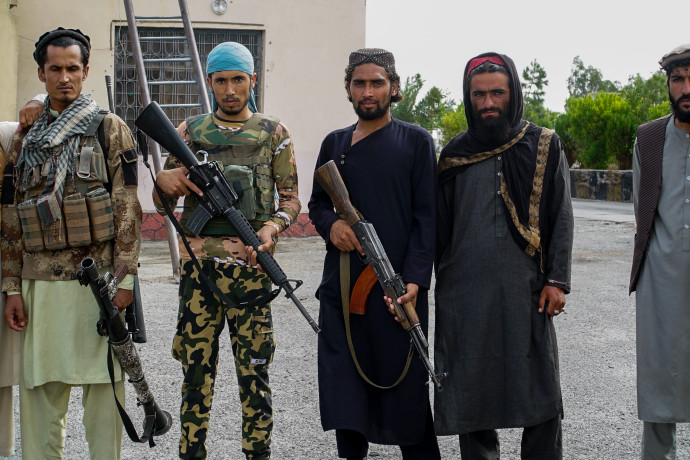
Although we could walk around in the sun, it was clear that we were being detained. As we sat around in the shadow, we told each other stories and stared into nothingness. Every now and then, Nasser stood up to make phone calls or initiate another lengthy and fruitless negotiation with our captors.
After one such attempt, he sat down next to me with a jolly smile. "Finally, they figured out what they want."
As he told me, we had to go to Kabul to pick up the permit in person. The permit that we needed to travel to Kabul. To pick up the permit.
The logic was eating its own tail, space-time continuum started to unravel, and the universe quietly wept somewhere in a corner. This was the Taliban Paradox, the first scientific achievement of the new regime.
The Second and Third Taliban Paradoxes
There was only one way to resolve the Taliban Paradox. If we couldn't go to Kabul, Kabul had to come to us. There is no such thing anywhere else in the world, only in Afghanistan. Late in the afternoon, two bearded, friendly-looking gentlemen arrived, they casually walked in through the courtyard gates, nodded to the teens armed to the teeth, and gave my fixer a big ole' hug.
Nasser was radiant with joy. "I've been on the phone with them all day," he said. "They work in the Ministry in Kabul, we're from the same region." There were no paperwork, loud words, or explanations. We picked up our stuff, one of the men opened the gates, and we walked away so naturally as if we could have done that any time we wanted. This was the Second Taliban Paradox.
"These people are their superiors; they had to obey their orders," Nasser explained as if the reason for our detainment wasn't the guards' disregard for their orders in the first place. The two men were also Taliban, although they didn't present any of the usual external signs: Their beards were well-kept, they wore plain clothes, and they didn't carry any weapons, let alone brand new American guns.
On top of that, they had a genuinely friendly demeanour. They insisted on us visiting their village. "It's getting dark. The road is not safe anymore," the fixer translated for one of our saviours as if they weren't preaching to me about how safe and orderly Afghanistan became since the Taliban had taken over. I've discovered the Third Taliban Paradox, and I've only been here a couple of hours.
Being a guest of the Taliban
Still, the two men radiated tranquillity, even though what was happening would have been a perfectly reasonable excuse for anxiety. I was in a car with a fixer I barely knew, two Taliban leaders I had just met, and we were driving through the desert to some unknown destination.
We first spotted the trees in the desolate landscape, then the houses among the trees along with the carefully irrigated cornfields around them. The setting sun drew long shadows over the lonely oasis in the rocky desert. "Isn't it beautiful?" – the two Taliban asked. "This is where we live; this is our hometown. We are happy to have you as our guest."
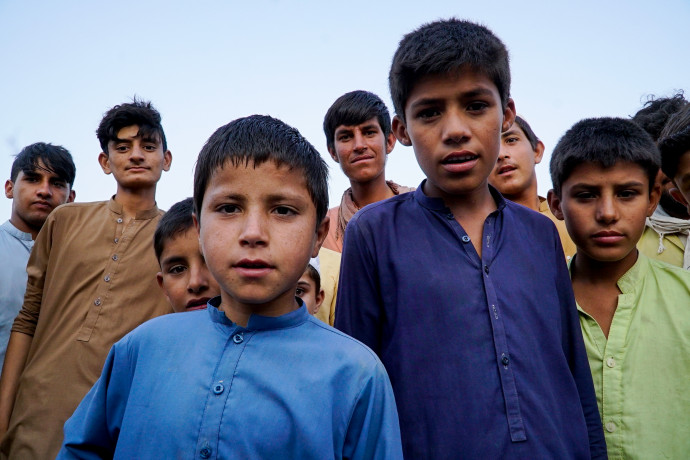
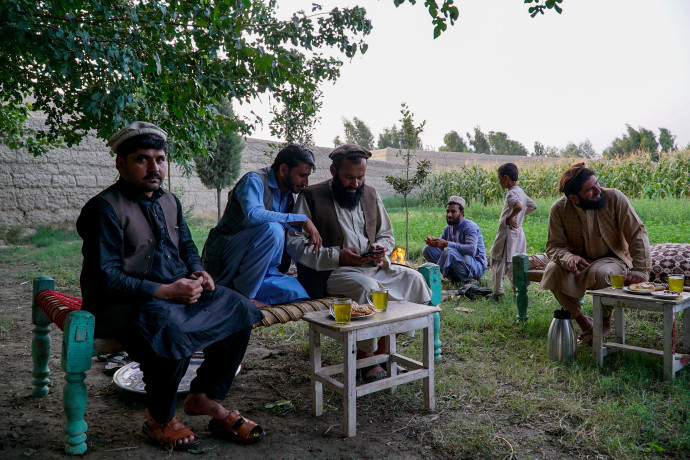
Then I got a glimpse of an aspect of Afghan culture that you never see on the evening news.
"Here, if someone tells you you are their guest, that means they would even sacrifice their lives for you,"
-my fixer explained while we were already laying on the rush mats under the fruit trees. We were surrounded by a dozen men, clad in turbans and kaftans, laying, sitting around, chatting, and some were roasting corn on the fire. A row of children stood in the background, watching motionless what the strangely dressed foreigner was doing. He drank tea. He bit into the corn. He said thanks for the cookies.
As bewildering as it is, I did not feel like an outsider. The crowd peacefully murmured, some of them talked to me with a smile while my fixer translated. They told me all of them were Taliban except for one man, a former police chief of the fallen Afghan government. "Aren't they bothered by the fact he served their enemies?" Nasser shrugged and said, "He is a guest too." Taliban Paradox no. 4.
The high point of the night was the feast. They laid a long tablecloth on the ground with lamb stew, rice with chicken, bowls of vegetables, and a seemingly endless supply of tea on it.
They think they exposed the USA
I used the after-dinner atmosphere to get my camera out. Now was the time to see if they were as apologetic with tough questions as with the police chief. "Ask away," Nasser encouraged me. And indeed, the people there were unphased as I pried at their paradoxes.
They said that everyone would get to live freely under the Taliban regime, and those who fled the country made the wrong call. "But why did they flee then?" – I asked. "Because they did not want to live by the laws of Islam." "So you can live freely, as long as you follow what the Taliban prescribe?" "You must accept the laws of Islam," they told me with a smile.
"Don't women have some things to fear?" "No, they can live their lives in peace too, just as they want." "Then why weren't there any women with us here all night? Men brought us the food, we ate with men, and we drank tea with men. Didn't any of these men's wives or daughters want to join?" "Women can do the same, but among themselves," they answered calmly.
As it happened, I was there on a rather notable date. "Do you know what day it is?" "11 September." "What does that mean to you?"
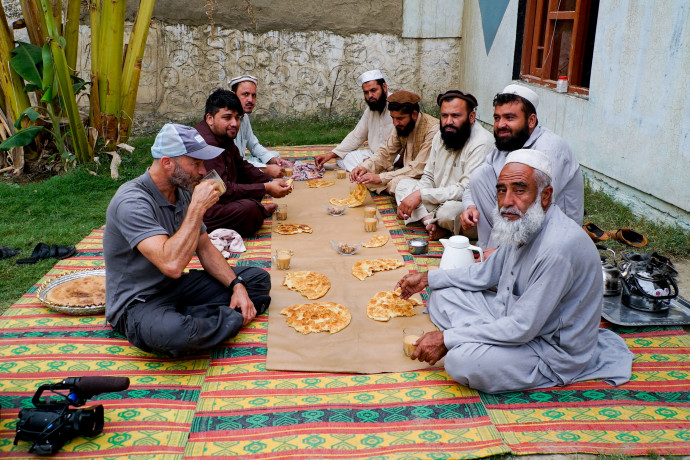
The men started to talk among themselves, smiling.
"For us, 11 September means that America was exposed for what it is. It is obvious that the attacks were staged by the Americans, as they gave America an excuse to invade our country. But we chased them away because lies cannot lead you to victory."
Warriors of culture
I felt like we were walking around in circles. I laid back and asked them what ministry they worked for. "For the Ministry of Culture." I got excited. In my head, I saw arts dealers, archaeologists, and poets turned Taliban. "Which part of the cultural world did you come from?" They didn't understand my question. So I took a different approach. "What did you do for a living before?"
"We were warriors; we engaged in combat with government forces in this area. When our superior was handed the Ministry of Culture, it was only natural that he employed his own people."
Afghanistan’s cultural life is in safe hands then.
After some time, it became apparent that the Taliban Paradoxes are stronger than any of my questions could ever hope to be. I laid back on my mat and stared at the stars blinking through the thick, hot desert air. My fixer patted me on the shoulder, telling me to sleep well, as here, everything revolves around the wellbeing of a guest. I closed my eye. I knew we had a long day ahead of us; we would set off for Kabul in the morning.
The translation of this article was made possible by our cooperation with the Heinrich Böll Foundation.